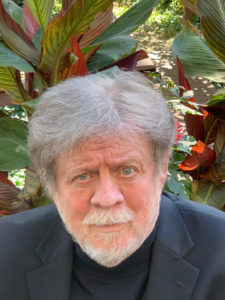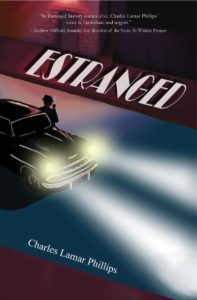Interview with CHARLES LAMAR PHILLIPS
by ANDREW GULLI
TSM: What inspired you to write Estranged?
CLP: I was heading up publications for the Iowa Historical Society and doing research on an article for its bi-monthly popular history magazine, which I edited, and I ran across an article in one of the established academic journals of the day about a reporter in Madison, Wisconsin, who had been used as a kind of test case by the state’s U.S. Senator Joseph McCarthy for the famous communist witch-hunt he launched in his bid for reelection in 1952. Everything just clicked together. I was working on a dissertation in Modern Letters about tough-guy writer Dashiell Hammett. Also, I had also just finished a collection of stories for my MFA at the Iowa Writers Workshop, and I was chomping at the bit to get to work on a novel. This thing, this story, just seemed so right to me. I began to think I might use both Cecil Parker of the Capitol Times and the noir patois of tough-guy fiction to portray the sense of paranoia and pettiness I had experienced in grad school and my early working life. I would do it all, I thought, in a historical novel set in 1950 with the true beat of American life in words and their sounds.
But I was young and a know-it-all and I did not do any of it of course. Instead, I left Iowa and headed back to my hometown of Washington, D.C., to make a living in work for newspapers and journals, but years later I came back to the original idea: a literary and historical novel with a noirish bent that used a moment in time to capture the quick of my country.
TSM: Who is your favorite noir author?
CLP: That’s difficult because there are so many: I love Dashiell Hammett’s brutal honesty, Robert B. Parker’s late-style minimalism, Robert Penn Warren’s aesthetic range, Loren Estleman’s cleverness, John D. Macdonald’s narrative drive, Sue Grafton’s consistency, Karin Slaughter’s swift terror–oh, and just in general, William McIlvanney’s Laidlow trilogy. But when push comes to shove, it’s got to be Raymond Chandler for the sheer beauty of his writing. However ramshackle his plots and politically dubious his thinking, few have ever captured in language the world around them so brilliantly as Chandler.

TSM: You wrote something in the 1950s, how much research did that entail?
CLP: Over the years as I wrote dozens of other articles and books—histories, biographies, even encyclopedias—and ghosted half a dozen more, I kept poking away at the novel, revising a first draft, adding this piece here and that piece there. And as I did so, I would keep doing more research, till I had what I wanted. So, in quantity . . . I don’t know. I was a baby boomer, so I remembered the tail end of the fifties pretty well. In fact, the first thing I remember watching on the tube, as my parents called it, was the televised Army-McCarthy congressional hearings! So, a lot of the little details I simply recalled from a hapless childhood. But the steady research over a number of years bolstered my confidence that I could actually paint a true picture of the period.
TSM: Who are some of the authors you enjoy reading?
CLP: How to do this without sounding pretentious? I have a deep, abiding affection for Shakespeare, especially the tragedies, and I re-read them every couple of years, as I do the Dubliners and parts of Ulysses, but also Robert Parker and Raymond Chandler, and I anxiously await every new Michael Connolly, especially the Bosches. When I was younger, my perennial favorite writers were Joan Didion and Vladimir Nabokov. In the last year or so, the book I enjoyed most was Kevon Barry’s Night Boat to Tangier (a new rift on noir if there ever was one!); This year I thought the best book I read was Joshua Cohen’s The Netanyahus.
 TSM: Why will we never lose our thirst for political thriller?
TSM: Why will we never lose our thirst for political thriller?
CLP: It’s just such a form fit for our historical times, capturing both our obsession with politics and our dread of them. It offers both a window on the world in which we are living and, more subtly, an escape from it. In political thrillers, the assholes who run our world and ruin it, more often than not get what’s coming to them.
TSM: What are you working on now?
CLP: Another literary and historical political piece with noir elements, set in Alabama in Freedom Summer when the locals were burning buses filled with college kids and Freedom Riders, all of it interlaced (at least, I think), with the story of a black widow killing off her husbands, her relatives, and her children. I’m leaning toward calling it Dry Blood, but who knows till it’s actually finished.
TSM: How have you managed to survive COVID?
CLP: Mostly by staying home even as a few beloved friends and family died off. It has been a couple of horrific years, affording us (or me, at least) an awful lot of time to think about how things have gone so wrong. Better for my writing, I’d say, than my psyche.
TSM: Did you write an outline of this novel first or did you have the germ of the idea and follow it?
CLP: Both. I had the germ of the idea and plunged into writing. Then, as the thing grew and I felt it getting out of hand, I sat down and did an extensive outline of what was whirling around in my head. Then I put the outline down, and I plunged back into the writing, during the course of which I lost the outline. My wife found it later, a year or so after I’d finished the novel and a couple of years after I’d written the outline. I had followed it almost scene by scene, which just shows how structured writing truly happens to be, even subconsciously, even if we want to think of it as something impulsive.
TSM: When you are not writing what are some of your hobbies?
CLP: I’d like to say mountain climbing or running marathons, but in fact, I read. I read constantly, and everything, from political journals to newspapers to novels to history and philosophy. It started when I was a kid, trapped in bed by a bout of Rheumatic fever, and that in turn fed a fever for books that never broke.
# # #
Charles Lamar Phillips is the author of Estranged (Regal House Press, Feb. 2021), which was honored with the 2021 NYC Big Book Award in the Political Thriller category. He is also the author of Dead South, Stories (Fomite Press, Feb. 2020). His fiction appears in the Massachusetts Review, New England Review, Cincinnati Review, Fifth Wednesday Journal, Chaffin Journal, Raritan, and others. A graduate of the Iowa Writers Workshop, Phillips has been a writer, columnist or editor at Congressional Quarterly, The Washington Star, Higher Education, and National Affairs, History News, and American History. He is now managing editor of the American Journal of Play. He resides with his wife Patricia Hogan in Rochester, New York. Visit his website at www.charleslamarphillips.com.
